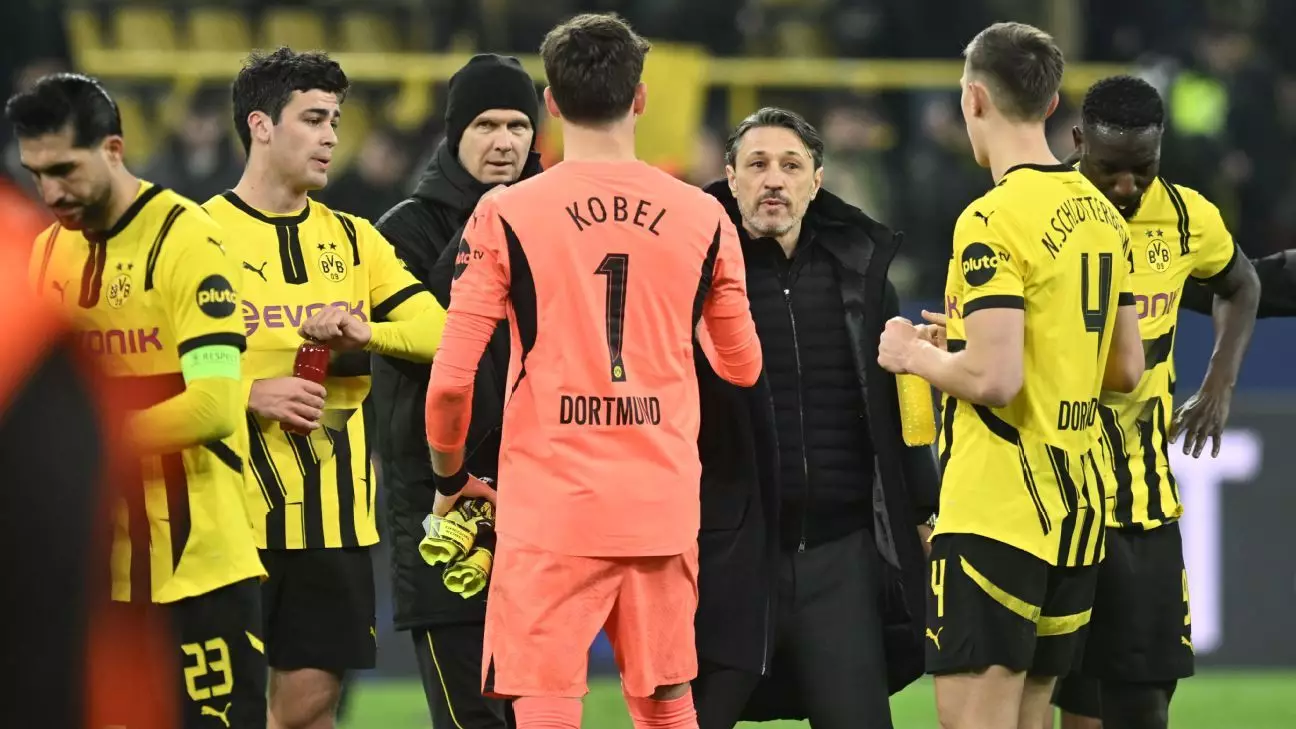Borussia Dortmund’s current season can only be described as a paradox. Despite the club’s impressive resources and rich history, they find themselves floundering outside the top half of the Bundesliga table. It’s astonishing to witness a club that was once synonymous with success and competitiveness grappling with existential questions two months into a campaign that initially brimmed with promise. Fans who expected a resurrection after last season’s bittersweet Champions League run are now left beleaguered, observing a team that has inexplicably lost its competitive edge.
The club’s optimism was rooted in their summer signings – players like Waldemar Anton and Serhou Guirassy seemed to bolster the squad’s potential for a revitalized performance. Aligned with the talented prospect Maxi Beier, these acquisitions were expected to drive the team forward after a fifth-place finish last season. The departures of stalwarts like Marco Reus and Mats Hummels may have been a loss, but the arrival of new blood alongside a fresh coaching approach was seen as a pivotal point for Dortmund. The expectation of ‘Stallgeruch,’ or the club’s intrinsic familiarity, played a significant role in selecting Nuri Şahin as the head coach, further convincing fans of a new dawn.
A Flawed Revival
On the surface, it appeared Dortmund might turn a corner under Şahin’s guidance. Paradoxically, while their home games showcased flashes of brilliance, the team’s performance away from home demonstrated a startling inconsistency. The duality of strength and vulnerability has left many observers questioning the team’s psychological makeup. Surprisingly, their Champions League performances offered a flicker of hope, proving that they could at least hold their ground against formidable opponents, but the early exit from the DFB-Pokal exposed cracks in their strategy that were impossible to ignore.
As winter set in, the inevitable occurred—Dortmund’s inability to navigate critical fixtures effectively led to Şahin’s dismissal after consecutive defeats, culminating in an embarrassing loss in Kiel. This situation underscored the urgent need for change and marked the end of a hopeful experiment. Niko Kovač, hired in the midst of the turmoil, faces the daunting task of revamping a struggling side without the benefit of a pre-season—his reputation for demanding fitness and rigor hinge on immediate results. Yet, he is met with a squad seemingly ill-equipped to address tactical challenges, as highlighted during their faltering performance against Lille in the Champions League.
Assessment of Talent
A thorough examination of Dortmund’s roster exposes glaring discrepancies compared to their league rivals, particularly Bayern Munich and Bayer Leverkusen. These rival teams possess game-changers in every position—yet BVB’s squad lacks that dynamism. Last season, goalkeeper Gregor Kobel stood out as a beacon of talent, and there were moments earlier this season when youth player Jamie Gittens appeared ready to ascend. However, a troubling downturn has rendered him less impactful, raising doubts about whether any Dortmund player could now secure a place in the illustrious starting XI of rival teams.
Moreover, vice-captain Julian Brandt fails to shine in comparison to prodigious talents like Jamal Musiala and Florian Wirtz. His understudy, Gio Reyna, reveals a disturbing trend—when chances emerge, he often appears unable to capitalize, perpetuating a cycle of underperformance. Once a magnet for youthful talent, Borussia Dortmund now finds itself overshadowed by clubs like Frankfurt, who seem to have adopted the developmental role that Dortmund previously excelled at, producing excellent players who transition seamlessly to the highest levels.
The shifting landscape poses a haunting question for Dortmund: who are they now? The Niko Kovač era must come with an acute understanding that in order to revitalize both teams and reputation, a cohesive identity needs to be recultivated. The upcoming matches against Augsburg, Lille, and RB Leipzig are crucial to deciphering their season’s trajectory, forming a vital litmus test for the newly appointed coach.
Crucial Turning Points Ahead
Looking forward, BVB’s ability to remain competitive hinges on their results in these imminent games. Each offers a unique challenge that could either propel them back into the Champions League conversation or condemn them to a season of mediocrity. In Augsburg, the aura of invincibility they usually command at home is under threat, fueled by the visitors’ impressive away form. Additionally, the stakes are exceptionally high when facing Lille, which could make or break their European aspirations and offer Kovač a rougher initiation than anticipated.
The fixture against RB Leipzig could potentially shape the narrative surrounding the club’s future—it presents an extraordinary opportunity despite being marred by risks. Winning such high-stakes encounters could reignite the ambitions of a squad craving affirmation, while a disastrous outcome might only serve to amplify the mounting questions surrounding the players’ quality and resolve.
As Borussia Dortmund navigates this tumultuous phase, the road to recovery will undoubtedly demand resilience, clarity of purpose, and, most importantly, talent — both in terms of emerging young stars and established players stepping up to reclaim their former glory. Only time will tell if they can reinvent themselves or if they will continue to linger in the shadows of their storied legacy.

